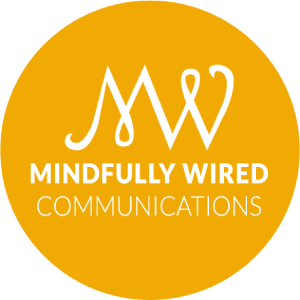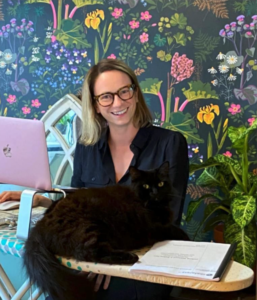Taking ten with our Director, Katrina
Firstly, little-known fact: you took over MWC having been an employee – right?
Yes! I am not the ‘founder’ of MWC, although I think I was Employee No.1 of what we’ll call ‘MWC 1.0’. MWC was first set up by a brilliant comms specialist, Rosie. After a few years, she wanted to go in a different direction – but I was totally ‘hooked’ on working in the environmental comms and fisheries world. I became the owner and Director, and MWC 2.0 was born five years ago.
Was there a moment when you realised a company like Mindfully Wired was necessary?
It came as a big surprise to me. I’d existed in a world of literature, art, and critical theory at university, but I hadn’t felt that there was a huge gap between me and the other disciplines. I hung out with a lot of scientists, and never felt that we had any issue communicating.
It was when I took a job in a post funded by the European Commission, working on fisheries science projects, that I realised just how different and impenetrable the world of science can be. The screen was full of complicated graphs, people were using fisheries terms like ‘B-lim’ and ‘spawning stock biomass’, which felt so inaccessible. That moment really stands in my mind, as I realised how big the gulf was. It was my job within that project to try and bring a creative approach to communicating incredibly technical fisheries management issues – whether it was through writing, film production or even art. This seemed like a natural approach to me; taking the facts or a case study and telling its story.
I realised that a company like Mindfully Wired could step in and introduce that creative thinking to complex, technical issues in the environmental sphere. There’s always so much nuance within environmental issues, and so many different ways of expressing that. It’s not about saying any particular way is better – data versus creativity – it’s about trying to find a common ground.
Science and creativity don’t tend to sit in the same room. How do you make that interplay work at MWC?
I approach it from my background of working predominantly with language and imagery to tell stories, and I’ve applied that to quite a scientific realm, as I feel it’s really important for people to understand environmental issues. As MWC grew, I was very conscious that I don’t have that background in science, so I wanted to hire people that did. The first person I hired was Harriet who has an environmental science degree. She exemplifies the fact that you can have a scientific background but be an inherently creative person. So really, the interplay is achieved by the people who work here. I think it’s a bit of a false narrative that the two things don’t go hand in hand: a lot of people have both sides of that coin. Perhaps the way we’re taught trains us out of it.
One of the main things that I’ve actively tried to instil as part of that interplay between arts and sciences – amongst anyone who comes to work for MWC – is to always, always think about the end point. Will your target audience enjoy reading this? Will they get what they need? That’s ultimately the most simple thing. Whether it be a precise briefing document for an MP, an eye-catching, colourful infographic, or a powerful campaign video.
How has MWCs work and client base evolved over time?
It’s evolved enormously. Again, it’s been led by people who join the team. We’ve evolved from something that was quite a classic comms agency, into something that’s a lot more than that. We’ve now got Team Creative & Marketing, our classic comms offering, Team Science & Policy which is much more like a specialist, policy-focused NGO or environmental consultancy; one with a very strong focus on the end audience and that communicates with a creative flair – which is really unusual. Our Events Team has evolved from our successes in facilitation and chairing. Clients expressed how organised and positive they found us, and were continually asking for help with their events, so it became clear that we should develop this as a separate offering.
The real inflection point, which I see as the moment that drove MWC into its current phase, was two years ago when I decided that it’s okay for us to have our own ideas that we think are important, and to go out and make them happen. We now design things from spec. You see that coming through in the Fisheries APPG and Seafood Cornwall there’s so many different, exciting projects that we have been able to bring to life. That’s really the most exciting way in which the business has changed: we’re not just servicing the needs of others, we are developing projects for ourselves and delivering against our own standards and milestones.
The phrase ‘communications consultancy’ barely scratches the surface of what we do. How would you summarise (in more than just two words) what exactly it is that we do at MWC?
Yes – I agree – ‘comms consultancy’ doesn’t really capture it! Particularly because people may think of communications consultancy as glossy, PR, image-management-type outfit, and actually the whole sector of communications has so many different facets. At our heart we really are a communications consultancy, but we see that as running events, chairing meetings, creating beautiful campaigns, facilitating, distilling information and then sharing it with the right audience.
Across everything, the reason why we – as a team – work so well together, and so well with our clients, is that we communicate effectively, creatively and kindly.
It’s almost that the issue is in the word ‘communications’ and people’s under-valuing of communications, and what that actually entails.
When I came out of my degree I absolutely wasn’t going to go and work in comms. I was certain is was surface-level and non-expert… and here I am literally running a comms agency. I’m pleased that we’ve found a way to do communications that strengthens projects that are super valuable and purposeful – and is entirely expert in how we both understand our sector, and how we craft our outputs.
Why is the work of MWC rooted in values and value-based messaging?
Because MWC has been shaped by what I personally, as an individual, wanted out of a job. I wanted a job that fascinated me, and that I felt good about. ‘Can I sleep at night if I work for this client?’ – that’s the benchmark. I always knew I was going to be structuring the company so that it’s based around its values, first and foremost, and is investing back into itself, rather than be purely commercially-driven. As the company has grown, I’ve tried to inform the way we work by putting myself in the shoes of other people. How else can you shape something purposeful, kind, that gets the most of the people involved, unless you put yourself in the shoes of your team? I’ve always tried to run the business based on human instinct, be pragmatic and flexible. And that has resulted in something that’s naturally very values-led.
That demonstrates that MWC is so rooted in who you are, and who we all are as employees. And that’s what makes everyone so hard-working and good at their jobs – they believe in what they’re doing.
I think there tends to be a prevailing societal narrative that owning a business is all about being hard-nosed, taking lots of risks, speculating to accumulate, always thinking about profit. That’s not a vision that I could ever identify with. Not because I’m a saint, but because, to me, that sounds terrifying! Going as risky as possible, accumulating as much profit as possible….that didn’t sit well with my wider life. Something people don’t talk about is that, at least with small companies, owning a business is quite an intensely personal thing… your business feels like an expression of your brain at times. A small business can be personal, and be an expression of how you think a job should be.

